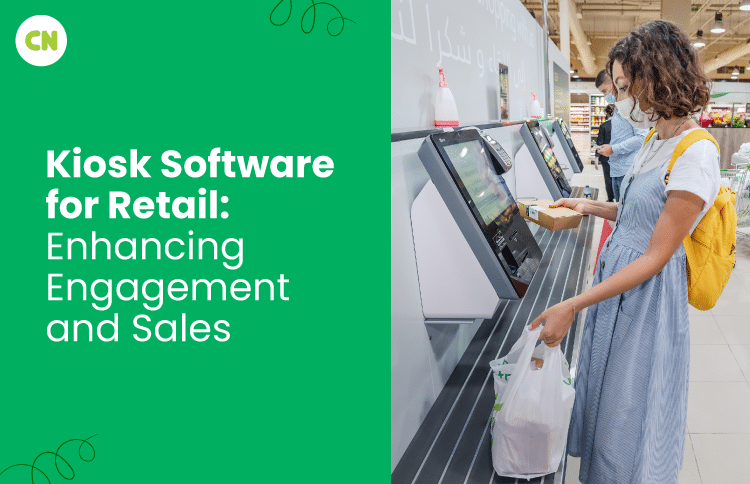Kiosk Software for Retail: Boosting Sales and Engaging Customers
Table of Contents
The retail industry is highly dynamic, making it essential for businesses to stay ahead of trends to succeed. One technology that has significantly impacted the market is kiosk software. This innovative tool has been reshaping how customers interact with businesses, leading to enhanced engagement and increased sales. In this article, we will explore the ways kiosk software has revolutionized the retail landscape, examining its benefits and how custom software development can tailor this technology to improve customer experience and boost business outcomes.
Understanding Kiosk Software
Kiosk software runs on machines in retail settings, allowing customers to perform tasks by themselves without needing staff help. These tasks might include looking up product details, checking prices, or buying items directly through the kiosk.
This software is designed to be user-friendly, so people can start using it without any trouble. When customers interact with the kiosk, they can touch the screen to navigate through different services offered by the store.
Enhancing Customer Engagement
1. Interactive Product Information
Kiosk software makes the traditional shopping experience innovative and interactive by giving its customers access to specific product descriptions. Consumers find it easy to check out product details, specifications, or reviews, thus giving them more power to make informed decisions about what to buy. As it does more than customer satisfaction, this helps to maintain customer loyalty and company image.
2. Virtual Try-Ons
Kiosk software now also supports virtual try-ons, which is especially useful in the fashion and beauty sectors. Customers can see how clothes, accessories, or makeup will look on them without the need to physically try them on. This not only saves time but also adds a fun element to shopping, making customers more engaged.
3. Interactive Promotions
Kiosks can also run interactive promotions where customers participate in games or contests to win coupons or discounts. These interactive elements make the shopping experience more engaging and can effectively increase sales while encouraging repeat visits. Interactive promotions also provide a unique way for retailers to introduce new products or highlight seasonal offers.
4. Wayfinding Capabilities
In larger stores or malls, kiosk software can include maps or directory services to help customers navigate the space. Shoppers can use these features to find specific products or store locations easily. This convenience improves the overall shopping experience, making it less overwhelming and more efficient for customers, especially in complex or crowded retail environments.
Streamlining Sales Processes
1. Self-Service Checkout
Kiosk software allows stores to offer self-service checkouts, speeding up the buying process by letting customers scan and pay for their purchases without waiting in line. This setup not only makes shopping quicker and easier for customers, enhancing their overall satisfaction, but it also frees up staff to focus on providing more personalized help where it’s needed most.
2. Order Customization
In industries like fast food and hospitality, kiosk software enables customers to tailor their orders to their preferences. For instance, when ordering a pizza, customers can choose their desired toppings and select from various drink options. This customization improves the customer experience by making it feel more personal and can also lead to higher sales as customers are more likely to purchase additional items.
3. Automated Upselling and Cross-Selling
Kiosk software can suggest additional products based on the customer’s current selections, effectively implementing automated upselling and cross-selling strategies. For example, if a customer is buying a camera, the kiosk might suggest purchasing a camera case or extra batteries. These recommendations help increase average order value and enhance the shopping experience by providing relevant suggestions that customers might not have considered.
Technical Advancements
1. Integration with Inventory Management
Kiosk software can seamlessly connect with any inventory management system. This integration allows it to show up-to-date information about what products are in stock, preventing the issue of customers finding out items are unavailable only when trying to purchase them. With real-time updates, retailers can manage their stock more effectively, ensuring they neither run out of products nor hold too much stock.
2. Data Analytics for Personalization
Kiosk software gathers important data about customer preferences and shopping habits. Retailers use this data with advanced analytics to personalize the shopping experience. This means they can create targeted promotions and suggest products that individual customers might like, based on their past behavior. This personalization helps build a stronger connection between the brand and its customers, making shopping more tailored and engaging.
3. Enhanced Security Measures
As kiosks often handle sensitive customer data and transactions, enhancing security measures is crucial. Modern kiosk software includes advanced encryption methods, secure user authentication processes, and regular security audits to protect against data breaches. This not only ensures compliance with data protection regulations but also builds customer confidence in using the kiosks. Additionally, the software often includes functionality to reset to a default state after each use, ensuring that one user’s data is not inadvertently available to the next user.
The Future of Kiosk Software in Retail
1. Expansion of Omni-Channel Strategies
Retailers are working hard to ensure a seamless shopping experience across multiple channels, with kiosk software playing a crucial role in these omni-channel strategies. This approach allows a customer’s shopping journey to start online, move to physical in-store interactions such as using kiosks, and potentially finish through another channel like a mobile app. This integration enhances both the efficiency and the overall shopping experience for customers, accommodating their preferences for varied shopping methods.
2. Adoption of Contactless Technologies
In recent times, there has been a strong focus on hygiene and safety, making contactless technologies increasingly important. Kiosk software is adapting by integrating more contactless features. These include contactless payments and virtual assistant platforms, enabling customers to make purchases without physical contact. This shift not only meets changing consumer expectations for safety but also modernizes the shopping experience to be more health-conscious.
3. Broader Accessibility Features
Future developments in kiosk software will likely emphasize making technology accessible to a wider range of users, including those with disabilities. Features such as voice recognition, adjustable interface designs for users of different heights, and multi-language support are expected to become more prevalent. These improvements will help ensure that all customers can benefit from the convenience of kiosks.
You May Also Read: AI in eCommerce: Shaping the Future of Customer Engagement
Conclusion
The complex world of retail means that embracing new technologies is essential. Kiosk software is a game-changer because it simplifies the sales process and greatly enhances the customer experience. Retailers who adopt this technology will remain relevant and competitive in a sector that’s always evolving. By using kiosk software, you can modernize how you engage with customers and improve your sales methods. Stay ahead in the retail game by integrating this innovative technology into your strategy.
Ready to transform your retail experience with custom kiosk software? Contact us today to discuss how our custom software development services can elevate your customer engagement and streamline your sales processes. Let’s innovate together and keep you ahead of the curve in the retail industry.

















